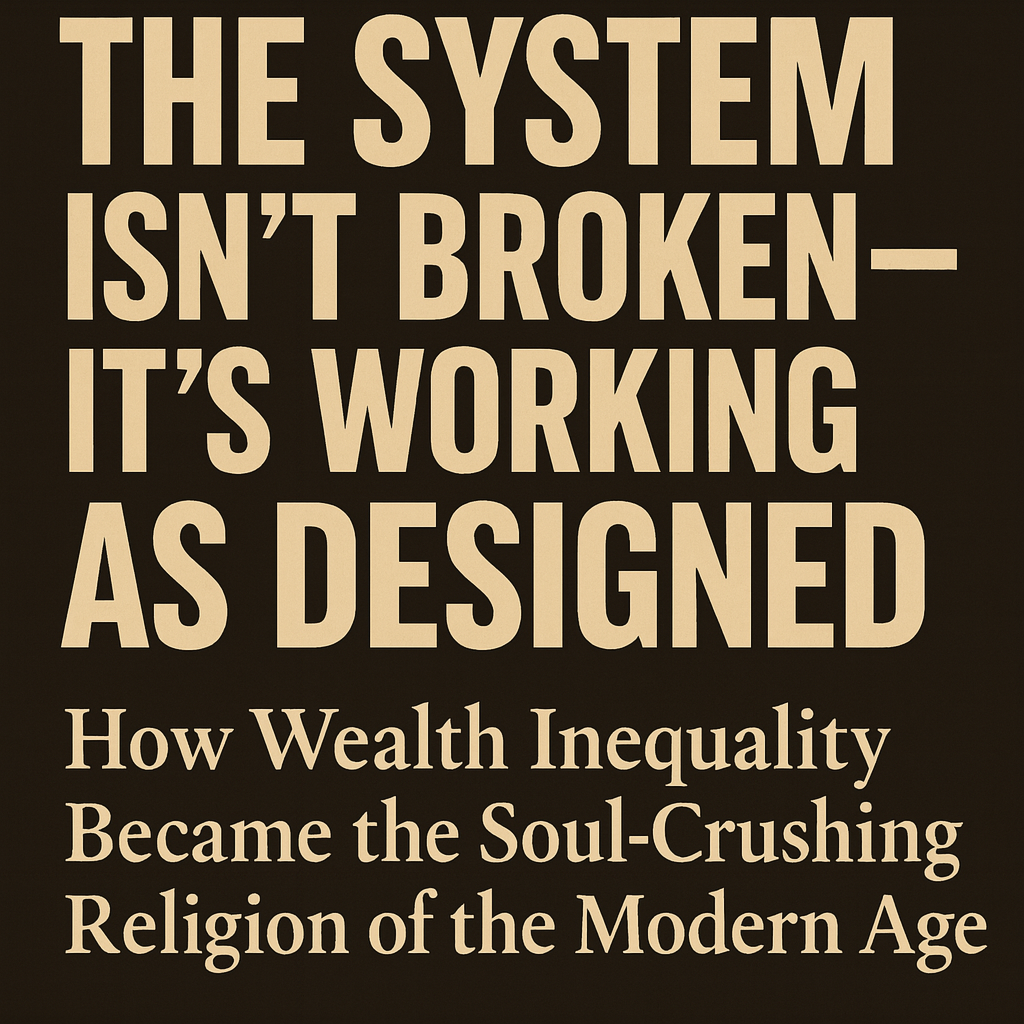Introduction: Lentils, Instagram, and the Illusion of Progress
There comes a moment when the veil slips. For some, it’s in the soup aisle, performing humiliating mental gymnastics over whether to buy lentils or toilet paper. For others, it’s after scrolling past a tech bro sermonizing about “leveraging your value” while you wonder how to survive the next rent increase.
In that surreal moment, a quiet realization creeps in: this isn’t life—it’s a slow-motion hostage situation, carefully designed to look like freedom.
The New Face of Feudalism
Despite all the sleek branding, algorithmic efficiency, and gig-economy “flexibility,” we haven’t evolved far from medieval serfdom. We’ve just replaced castles with boardrooms and kings with CEOs. The lords still hoard land and resources. The peasants just now carry smartphones and deliver DoorDash.
This isn’t capitalism in its ideal form—where hard work yields reward—it’s a mutation: a rigged casino where wealth flows not toward value creation, but toward asset ownership, extraction, and inheritance.
The Great Harvest of the Middle Class
The middle class didn’t just disappear. It was harvested. Dissected. Sold off.
From 1945 to 1975, the U.S. experienced a rare golden window of shared prosperity. One income could support a family. Unions were strong. College was affordable. CEOs earned 20–30 times more than their workers—not 500.
Then came neoliberalism: deregulation, privatization, and tax cuts for the wealthy. The economy was “liberated,” we were told. In reality, the very structures that allowed upward mobility were dismantled—brick by brick.
When Work No Longer Pays
Capitalism once rewarded labor. Today, it rewards ownership.
You don’t get rich by doing—you get rich by owning: land, stocks, companies, algorithms, other people’s labor. In this late-stage model, wages stagnate while asset prices explode. The harder you work, the more you’re blamed for falling behind.
Trickle-down economics turned out to be a golden shower. The rich got tax cuts and stock buybacks. The rest got “side hustles” and burnout. Freedom was rebranded as freelance desperation.
Mental Health as a Feature of the System
Wealth inequality isn’t just financial—it’s psychological warfare. It slowly corrodes the self-esteem of millions of people who internalize their struggles as personal failures.
If you can’t afford housing, it must be because you’re lazy.
If you’re burnt out, it must be because you didn’t hustle hard enough.
If you’re anxious, you probably just need a better planner or a cold plunge.
The genius of this system lies in making you blame yourself instead of questioning the structure. You become your own prison guard.
Influencers, Gaslighting, and the Shame Machine
Capitalism’s greatest trick is the spiritual hijacking of self-worth. Today, your value is measured in metrics: income, followers, hustle hours, aesthetic minimalism (that still costs money).
So we optimize. We chase. We “manifest.” And when it doesn’t work, we double down—on shame, on side gigs, on trying harder—while the real game was rigged before we were born.
Meanwhile, billionaires escape accountability, hoard wealth, and pay less in taxes than your local schoolteacher.
Poverty Is Not a Lack of Character—It’s a Lack of Cash
Rutger Bregman put it plainly: “Poverty is not a lack of character. It’s a lack of cash.”
But our culture refuses to hear it. We treat poverty like a moral failure. We assume poor people are irresponsible, lazy, or broken. In reality, most are responding rationally to an irrational world—a system that demands burnout and calls exhaustion “weakness.”
As Joseph Stiglitz, former World Bank Chief Economist, warned: this level of inequality is corrosive to democracy itself.
Collapse as Strategy
Former Citibank trader Gary Stevenson described the system as it truly is: the rich aren’t trying to create growth—they’re betting on collapse. Because collapse concentrates power. Fear makes labor cheap. Desperation makes people compliant.
So when the world feels like it’s falling apart, understand—it’s not just neglect. It’s often by design.
Spiritual Death and the Cult of Productivity
Chris Hedges goes further. He sees not just economic collapse, but moral and spiritual death—a world where everything is commodified: time, attention, even suffering.
When every experience is transactional, you’re no longer human. You’re a brand. A walking algorithm. And if your brand doesn’t perform, you’re treated as defective—not poor, not overwhelmed—defective, like a toaster that won’t toast.
Escaping the Matrix (But Not with a Podcast)
Here’s the ugly truth: wealth inequality isn’t a glitch in the Matrix—it is the Matrix. It’s centuries-old, evolving from feudalism to industrial exploitation to today’s financialized, data-driven Ponzi scheme.
And you can’t escape by “manifesting abundance” or optimizing your calendar. You escape, partially, by refusing to play.
What Do We Do? The Quiet Revolution
No, this article doesn’t end with a five-step program to riches. That’s the language of the system.
But here’s what we can do:
- Stop internalizing structural failure as personal failure.
You’re not lazy. You’re exhausted. - Reassess value.
Prioritize meaning over monetization. Choose sanity over GDP growth. - Say no to metrics.
Your soul is not a quarterly KPI. - Practice cultural minimalism.
Not as a trend—but as rebellion. Want less. Own less. Breathe more. - Cultivate micro-agency.
Grow food. Talk to neighbors. Refuse to be optimized. Protect your peace. - Demand structural change.
Tax reform. UBI. Campaign finance reform. Wealth caps. Public investment. - Dismantle the shame machine.
Shame is profitable. Reject it.
Final Word: Refuse to Collapse with the Empire
When the Empire is collapsing, the most radical act is to refuse to collapse with it. Don’t internalize its logic. Don’t buy its false hope. Don’t worship its false gods.
Instead:
- Love someone so deeply they forget to check their phone.
- Laugh inappropriately.
- Plant something.
- Tell the truth.
- Want less.
- Choose presence over profit.
- Depth over display.
Because the moment you stop playing their game, the machine begins to lose.
And maybe—just maybe—that’s how freedom begins.
The Soul-Crushing Machine: A Point-by-Point Breakdown of Wealth Inequality, Modern Feudalism, and the Quiet Rebellion
I. The Everyday Breaking Point: Survival Math in the Soup Aisle
- A moment of financial despair: choosing between lentils and toilet paper.
- Social media disconnect: Tech-bro advice vs. real-world indignity.
- Insight: Wealth inequality is not abstract—it’s emotional erosion.
II. The Lie of Meritocracy and the Rigged Game
- Doing everything “right” and still falling behind.
- The invisible shame of failing in a system designed to exploit.
- Realization: You are not broken—the system is.
III. The Engineered System: Extraction, Not Opportunity
- The system extracts time, energy, dignity—and gives back just enough dopamine to suppress revolt.
- Inequality is a structural chasm, not just a statistical gap.
- The rich hoard wealth; the rest hoard anxiety and debt.
- It’s not about income alone—but generational capital hoarding and attention commodification.
IV. The Death of the Middle Class
- The middle class wasn’t lost—it was harvested.
- The top 1% now controls more wealth than the bottom 50%.
- Capitalism in theory: value for labor. In practice: ownership > contribution.
- Trickle-down economics = trickle-up wealth transfer through tax cuts, stock buybacks, offshore accounts.
V. The Rise of Techno-Feudalism
- The gig economy replaces stable labor with unstable “freedom.”
- Medieval structures reskinned: kings → CEOs, peasants → freelancers.
- Modern feudalism: private ownership of land, work, shelter—and your mind.
VI. Historical Echoes: Gilded Age to Neoliberal Collapse
- Gilded Age: Tycoons destabilized democracy; labor strikes followed.
- Golden Age (1945–1975): One income = stability; high taxes on rich; strong unions.
- Neoliberalism dismantled that era: deregulation, privatization, free-market worship.
VII. The Gaslighting Generation
- Millennials and Gen Z inherit debt, disaster, and diminishing returns—then get blamed.
- Cultural delusion: “You’re entitled and lazy,” while the system squeezes harder.
- Emotional consequence: slow psychological breakdown masked as personal failure.
VIII. The Internalization of Shame
- Hustle culture makes burnout look like a lack of effort.
- You’re not a person—you’re a productivity unit and a brand.
- Shame becomes self-imprisonment: you internalize the system’s cruelty.
IX. Whistleblowers of Reality
- Gary Stevenson: former trader turned critic—explains money hoarding and systemic rot.
- Chris Hedges: moral collapse mirrors economic collapse; commodification kills meaning.
- Wealth inequality isn’t just economic—it’s existential and spiritual.
X. The Meritocracy Con
- The illusion: Hard work = reward. Reality: Monopoly started before you arrived.
- Success becomes identity; failure becomes pathology.
- Upward mobility is an illusion that keeps you docile.
XI. Weaponized Identity and Emotional Poverty
- Your net worth becomes your self-worth.
- Social media + capitalism = low-budget knockoff of yourself.
- The emotional poverty of feeling “defective” for being tired, poor, or unfulfilled.
XII. Capitalism’s Greatest Trick
- Capitalism weaponizes shame to keep you hustling and blaming yourself.
- You become your own unpaid prison guard—policing your worth in metrics.
XIII. The Death of Democracy
- Joseph Stiglitz: This is not capitalism; it’s oligarchy in disguise.
- Thomas Piketty: Capital always grows faster than labor—unless stopped by reform.
- Result: Democratic decay, soul erosion, rigged and boring systems.
XIV. Symptoms of a Spiritually Sick Society
- Depression, anxiety, addiction = symptoms of systemic abuse, not personal pathology.
- People are not broken. They are reacting sanely to a psychotic system.
XV. The Real Game Plan of the Elites
- Collapse is profitable. Fear makes labor cheap and people compliant.
- The system is not failing—it is succeeding at crushing you by design.
- Every brand of cereal is an illusion of choice while the wealth flows upward.
XVI. Identity as Product: Brand Over Being
- When every human attribute is monetized, you cease being a soul—you become data.
- You’re no longer poor—you’re “defective,” and shame becomes your software.
XVII. The Spiritual Death of Meaning
- GDP ≠ well-being. Growth ≠ goodness.
- We stopped asking, “What kind of world are we building?” and now only ask, “What’s it worth?”
XVIII. Suggested Responses: The Quiet Revolution
- Reclaim the right to opt out of the hustle, metrics, and shame game.
- Reassess value—return to meaning over monetization.
- Minimalism isn’t aesthetic—it’s resistance. A quiet rebellion against consumer control.
XIX. Toward a New Value System
- Stop gaslighting yourself.
- Recognize the math-backed truth: inequality is policy, not fate.
- Redefine success through agency, simplicity, time, relationship, and rest.
XX. Small-Scale Agency in a Big Machine
- You can’t fix Wall Street, but you can plant a seed, say no to hustle culture, and stop performing for LinkedIn.
- Choose moments of nothingness. Breathe. Laugh. Love.
- Opt out, even a little, and you reclaim the soul they’ve tried to turn into currency.
XXI. Final Message: Don’t Collapse with the Empire
- Most radical act: Refuse to collapse with the collapsing empire.
- Say no to the game.
- Choose presence over profit, depth over display, and truth over branding.
- If enough people stop playing, the system loses.







